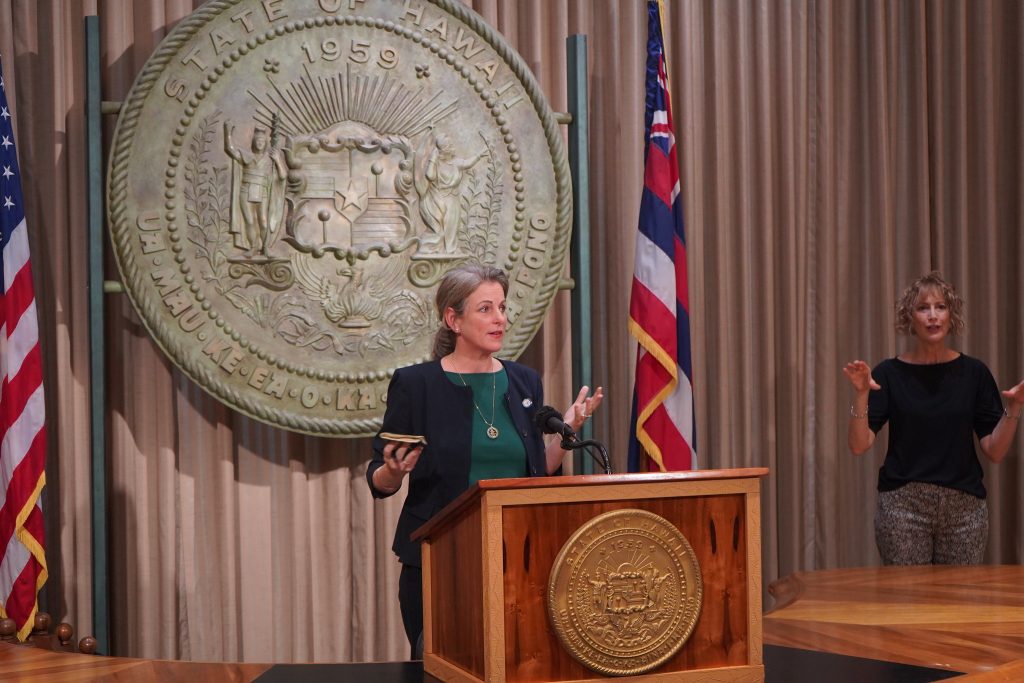Bills Relating to Human Trafficking, Divorce, and Child Exploitation Become Law

Governor David Ige today signed three bills into law, supported by the Women’s Legislative Caucus, relating to human trafficking, divorce and child exploitation.
“These measures are important to prevent potential abuses, to assist victims with transition from a hostile situation, and to increase penalties for those who benefit from exploiting others,” said Governor David Ige during the live streamed event. “These bills help to ensure the safety and well being of our friends, neighbors and families who are in vulnerable situations.”
“The exploitation of another person is totally unacceptable in our community, and increasing the penalties for such egregious action sends the signal that we will not tolerate it here in our community,” said Gov. Ige.
Sen. Roslyn Baker of Maui who is co-convenor of Women’s Legislative Caucus said, “We appreciate the fact that we can come together and put together a package that not only is endorsed by our women colleagues, but by our male colleagues as well. Because we need everybody in the community to understand that actions against women, girls, (and) children is just not acceptable in our state… We continue to make progress in our state to make sure that women and girls are not only protected, but given new opportunities and lifted up; and this is just another example.”
Among the bills signed into law was SB834 Relating to Childlike Sex Dolls.
“Based on the experience of law enforcement, these dolls are often indicative of an individual’s desire to harm a real child if given the opportunity,” said Rep. Linda Ichiyama, co-convenor, Women’s Legislative Caucus. “Individuals found in possession of these dolls are also often in possession of child sexual exploitation material, commonly known as child pornography. Unfortunately, Hawaiʻi has been used as a gateway for the importation of these dolls into the rest of the United States. By prohibiting the sale and importation or possession of child-like sex dolls in Hawaiʻi, it not only prevents the obscene representation of the sexual abuse of children, but can also help protect the public from predatory sex offenders across the nation.”

Another bill signed into law today was HB887 Relating to Crime.
“It is a particularly important moment for my department, because it is directly tied to an institutional decision that we made last year when we created a position for a human trafficking coordinator. It’s the first time in our state that we’ve had such a position,” said state Attorney General Clare Connors.
“It allowed us to put forward a center of gravity that has helped us collaborate and move the ball forward on important legislative measures, collaboration with our service providers, and also with our law enforcement agents… This legislative is one culmination of all that work,” said AG Connors. “Our laws frame how we talk about human trafficking; our laws frame our public discourse with victims and with those that we are seeking to bring to justice. So this was a great moment.”
According to AG Connors, the language used in this particular bill is significant because the department moved away from certain terms that have defined the conversation for a long time.
“We no longer use the word prostitute. In this legislation we have gotten rid of it altogether. In this legislation, we use the term commercial sexual exploitation. That changes the narrative. It creates a narrative that supports victims. It talks about what survivors are going through. It helps us not only talk again to the public, but to move these victims through our system differently. We support them. We treat them the way they need to be treated so that they can really feel the justice that we are all trying to work to achieve on their behalf,” she said.
AG Connors noted that the term commercial sexual exploitation is not only being used for misdemeanor crime, but for felony crime as well. She said the term is used “as opposed to the solicitation or patronization of a minor in particular for sex.”
“We are now holding traffickers strictly liable if they engage in sexual exploitation of a minor,” said AG Connors, noting that “it doesn’t matter–since we believe that minors can’t consent–whether or not you know that your victim is a minor.” She said this argument cannot be used as a defense.
According to AG Connors, the statute of limitations has also been removed. “It used to be six years. Now as we are investigating current cases and we learn the victims that were victimized in the past, we can also bring them into the system. And we can also help them move through this process of seeking and achieving justice.”
Also in the bill, it’s not just a fee that is exchanged for sexual exploitation conduct–it is also anything of value. “Because we know that’s how these bad actors operate. They exchange drugs or housing, or anything of value to exploit the victims that we are seeking to protect,” said AG Connors.
She said the changes will help prosecutors, service providers and educators to save and heal lives.
A final bill that was signed as part of the caucus package was SB828 Relating to Divorce
Angelina Mercado, executive director, Hawai‘i State Coalition Against Domestic Violence, spoke on behalf of the survivors of domestic violence.
“This is really important legislation. What it does is it removes the six month residency requirement to file for divorce in Hawai‘i,” said Mercado. “This matters because we know that survivors of domestic violence, when they choose to flee, become the most important and dangerous time of their lives. Requiring them to stay here for six months after they make that important decision is probably one of the most dangerous times in their lives. What this legislation, we hope will do, is provide opportunities to reconnect with families, support networks and quite frankly, flee when they can.”
The bills were signed during a ceremony at the Hawai‘i State Capitol, Office of the Governor, 5th floor, Governor’s Ceremonial Room.









